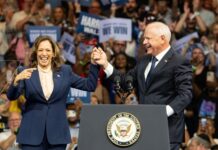
As Congress grapples with an impending government shutdown, the House Freedom Caucus, a group of hardline conservatives, is taking a firm stance in the negotiations, signaling a turbulent path ahead for Republican leadership. The caucus, known for its fiscal conservatism and influence within the GOP, has made clear its demands and is willing to shut down the government to achieve them.
The Freedom Caucus is pushing for significant spending cuts, arguing that the current levels of federal spending are unsustainable. They are particularly focused on reducing funding for what they consider wasteful programs and reversing recent increases in domestic spending. This faction’s demands are not just a challenge to Democrats but also to more moderate Republicans, who are wary of the political fallout from a shutdown.
Freedom Caucus promises chaos when Congress returns next month
The far-right House Freedom Caucus is gearing up for a government-shutdown fight and a chaotic lame-duck session after the election, no matter who wins. https://t.co/HO1pT9UQaO #ncpol pic.twitter.com/X8SUrLKUch
— Mike (@jmsexton_) August 12, 2024
As the September 30 deadline to fund the government looms, the Freedom Caucus is insisting on the inclusion of policy riders that target Biden administration initiatives. These include efforts to block funding for the enforcement of vaccine mandates and the implementation of diversity, equity, and inclusion (DEI) programs across federal agencies. The caucus also seeks to dismantle recent climate-related spending, arguing that it hampers economic growth and burdens American taxpayers.
House Speaker Kevin McCarthy finds himself in a precarious position, trying to navigate the demands of the Freedom Caucus while maintaining the support of more centrist Republicans who are concerned about the potential backlash of a government shutdown. McCarthy's leadership is being tested as he attempts to craft a continuing resolution that can pass both the House and the Senate without alienating the various factions within his party.
“Stop Illegals from Voting and Block The Biden-Harris Omnibus” pic.twitter.com/dPJ3Gh3GyY
— House Freedom Caucus (@freedomcaucus) August 12, 2024
The Freedom Caucus has a history of leveraging government funding deadlines to achieve their goals. In past negotiations, they have used their influence to push for deep spending cuts and policy concessions, often leading to last-minute deals that avert shutdowns but leave lasting divisions within the GOP. This time, however, the caucus seems prepared to go further, indicating that they are willing to allow a shutdown if their demands are not met.
Democrats, on the other hand, are preparing to place the blame squarely on Republicans if a shutdown occurs. They argue that the Freedom Caucus's demands are extreme and that a shutdown would harm ordinary Americans, from federal employees to those relying on government services. Senate Majority Leader Chuck Schumer has already criticized the caucus, calling their tactics reckless and urging Republicans to reject what he describes as fringe demands.
The standoff over the budget is just one of several battles brewing in Washington. The Freedom Caucus’s actions are part of a broader effort by the group to steer the Republican Party further to the right, challenging the leadership to embrace their agenda or face political consequences. As negotiations continue, the risk of a prolonged shutdown grows, with significant implications for both parties as they head into the 2024 election cycle.
This confrontation comes on the heels of other high-profile disputes between the Freedom Caucus and GOP leadership, including over the debt ceiling earlier this year. The outcome of these negotiations could set the tone for the rest of the legislative session and impact the Republican Party’s strategy going into the next election.












